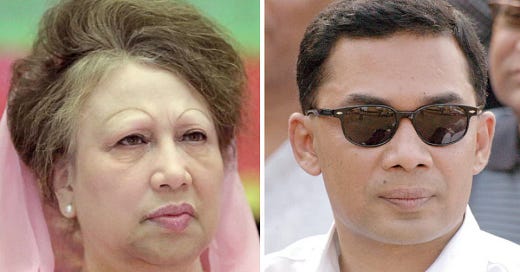Who are the Bangladesh far-right?
In case you didn't know, the far-right have infiltrated widely across Bangladesh.
Bangladesh Nationalist Party (BNP)
The Bangladesh Nationalist Party (BNP) was historically credited for free market reforms. The BNP failed to sustain and follow through on these reforms. By 2001, the party became the fiefdom of its chairperson Khaleda Zia and her son Tarique Rahman (alias Tarique Zia). Today, the BNP is a shadow of its former self. It relies on a critical alliance with the Jamaat, a group which opposed the liberation of Bangladesh in 1971 and aided the Pakistani army in its genocide against pro-liberation Bengalis. BNP acting chairman Tarique Rahman has been accused of corruption and links to terrorism.
Today, the BNP is an anti-system party which seeks to discredit the events of 1971, the subsequent constitution enacted in 1972, and many aspects of Bangladeshi identity. While publicly professing Bangladeshi nationalism, the BNP community in private often belittles, discredits and undermines the history of Bangladesh. It has an ambiguous vision about the future of Bangladesh and the wider region.
A key hallmark of the BNP’s politics is historical revisionism and falsifications. The language of its leader Khaleda Zia is devoid of any liberal democratic values. She focuses her political rhetoric solely on opposition to the Awami League. The BNP also includes far-left voices in its ranks, including former communists and Maoists. There is an odd strategic alliance between the far-left and far-right in Bangladesh.
Jamaat-e-Islami
The Jamaat has a vision for a draconian Islamic government. It is strategically co-existing with other segments of Bangladeshi society with the ultimate goal of converting Bangladesh into a theocracy. The Jamaat opposed the partition of India in 1947 and the liberation of Bangladesh in 1971. It was banned by the first government of Bangladesh. The ban was lifted by the BNP in the late 1970s.
There is extensive documentation of the Jamaat’s role in a genocide against the people of Bangladesh in 1971; the Jamaat’s links to terrorist groups; the violence of Jamaat’s student wing Shibir against Bangladeshi students and academics; and the Jamaat’s role in numerous attacks on religious and social minorities.
BNP-Jamaat media networks
Networks in the media are now the main focal point for BNP-Jamaat politics. In the absence of savvy political leadership, BNP-Jamaat activists have taken to the media as either journalists, commentators, writers, or public intellectuals. They have also drawn a significant number of Bangladeshi professionals to their cause. Several influential newspapers in Bangladesh have also switched to supporting BNP-Jamaat, after disputes with the Awami League government over the country’s state of affairs.
The pro-Maoist New Age newspaper, whose editor was involved in communist politics in the past, is a longstanding supporter of BNP-Jamaat as part of the odd nexus between far-left and far-right. The paper includes BNP activists among its staff.
One major BNP-Jamaat lobby is called Bangladeshi Journalists in International Media (BJIM). BJIM is a network of pro-BNP and pro-Jamaat media personnel who are reporting on Bangladesh for major international news outlets. Currently, there is a disproportionately higher representation of BJIM voices in the international media. Sherlock Holmes met one of these journalists, who claimed to be a communist. He was mingling with Pakistani diplomats.
BNP-Jamaat media networks are often outshining the party leadership in getting their collective message across to the wider world. They have proven to be an effective propaganda network against the Bangladeshi state.
Foreign back-up
Interestingly, BNP-Jamaat goals for regime change have received funding from America’s National Endowment for Democracy, which funds the Netra News outlet. Netra News is a well-known mouthpiece for the BNP-Jamaat. The National Endowment for Democracy promotes regime change and gets funding from the United States Congress.
BNP-Jamaat also receive funding from Pakistan. In 2012, Asad Durrani, the former head of Pakistan’s Inter-Services Intelligence (ISI) agency, informed his country’s Supreme Court about ISI funding to BNP during the 1991, 1996 and 2001 elections in Bangladesh. This is available on the official record of the Pakistan Supreme Court.
What differentiates the far-right from the centre-right?
It is important distinguish between far-right politics and centre-right politics. Sherlock Holmes considers the contemporary BNP to be leaning towards the far-right because of its alliance with Jamaat since 2001. The BNP high command, especially its leader Khaleda Zia and her son Tarique, are well known to utter hate speech. The BNP inducted the Jamaat into the cabinet of Bangladesh in 2001. This was the first time that Jamaat was given ministerial posts in the cabinet of the Government of Bangladesh. No other governing party in Bangladesh gave this privilege to far-right groups. The Awami League, even though it is traditionally a centre-left party, has implemented liberal economic policies which may be considered centre-right. The Jatiyo Party, which pursued a constitutional recognition of Islam, can also be considered centre-right.






